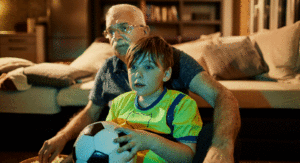 HYANNIS – Ellen McCabe, RN, FNP-BC, CHPN not only teaches caregivers, she’s been one. And that helps her to appreciate her current program topic: How family and caregivers can use empathy to communicate with those who have dementia.
HYANNIS – Ellen McCabe, RN, FNP-BC, CHPN not only teaches caregivers, she’s been one. And that helps her to appreciate her current program topic: How family and caregivers can use empathy to communicate with those who have dementia.
“It’s about a shared power dynamic, versus ‘I’m your caregiver and I say what you do,’” said McCabe. “Because normally, most people, if they don’t realize that they’ve got cognitive impairment, they’re going to push back against that.”
McCabe, who was a hospice and acute care nurse before becoming a certified family nurse practitioner, is a community educator for the Visiting Nurse Association of Cape Cod. She will present a program about empathetic communication from 11 a.m. to 12:30 p.m. Nov. 14 at the Barnstable Adult Community Center, 825 Falmouth Road. The program is free, although the senior center requests attendees RSVP by calling 508-862-4750. There are also a few appointments available for memory screening that day.
Empathetic communication can be a boon to both caregivers and those with all types of memory-related illnesses, said McCabe, whose father-in-law suffered from Alzheimer’s and lived with her and her family. She also has a son who was born with cognitive deficits. She remembers one particularly tough day when it was her turn to be on caretaking duty after a day of work. Her father-in-law and son were watching a movie together. But dinner needed fixing, her son hadn’t done his homework, and her father-in-law required a trip to the bathroom.
She went into in-charge mode, she said, ordering them to turn off the TV, telling her son to do his homework, and her father-in-law to get to the bathroom. She started to make dinner.
Her charges rebelled and, in fact, bridged their cognitive differences to join in solidarity. “And my son stands next to his Papa with his best language and he says, “We no like way you treat us,” McCabe says. Her father-in-law pumped his fist.
At that moment, she realized she had not been empathetic or considered their happiness in the moment of sharing the movie. She was just trying to get done what she needed to do.
“I had just been ordering everybody around. And I think that’s the crux of it,” she said. In hindsight, she thinks she might have suggested, “Dad, it’s almost time for dinner. How about we go into the bathroom and wash hands and stuff. And then, as long as we’re in here, do you want to go to the bathroom?”
McCabe describes dementia as a cluster of symptoms that prevent someone from being able to perceive their environment the way it really is. Some of those symptoms, such as apraxia, prevent someone from being able to complete a task because they cannot remember the steps to, say, tying their shoes. Other symptoms are more broadly cognitive, such as changes in visual perception. People with Alzheimer’s for example, have altered color and depth perception and are less able to see contrast, McCabe said. A dark rug may look like a hole in the floor.
Keeping that in mind, she offers several tips for caregivers on how to approach someone with dementia empathetically.
Rethink how you communicate: Remember that someone may not understand verbal communication. Only about 10 percent of what we communicate in a message comes across verbally, she said, the rest lies in tone and body language. So, caregivers need to watch how they stand, or their tone of voice. Caregivers are “strangers in a strange land,” she added, who need to communicate as if they were someplace where they didn’t speak the verbal language and had to read and use body language and other nonverbal communication.
Walk in their shoes: Caregivers need to think about how they would like to be treated. “How patient would I want a caregiver to be,” she says. “How hard would I want somebody to understand? I wouldn’t want them to judge me.”
Exude trustworthiness: The most important thing to communicate is trust, McCabe said. “The ultimate goal of empathetic communication is to tell a person who might not recognize the relationship between us that I’m trying my hardest. And I’m trustworthy. That I’ve got their best interests [in mind], not from what I think is right, but from their perspective.”
Don’t sweat the small stuff: Empathy might also mean letting go of what’s not important, she said. For example, one of the hardest tasks for many caregivers is getting a patient into a shower. “The caregiver’s constantly stressed out (thinking): I’m going to have to face this thing where I’m struggling with someone who doesn’t think they need my help.” But there are ways, McCabe said, to encourage someone, perhaps by lighting a candle, or enticing them with a sweet-smelling soap, or even letting them shower in their underwear. “You might have to shower somebody in a T-shirt and underwear. Big deal,” she said. “It will make a lot more sense to [the patient] to get those wet things off at the end. What’s the harm? At least someone doesn’t feel so vulnerable. Try to give them more control.”
Utilize strategies that worked early in life: Some strategies, like distraction, are the same strategies that would have worked early in the person’s life, McCabe said, but she warns against infantilizing those with dementia. “That wouldn’t be dignified, it wouldn’t be appropriate,” she said. But sometimes she asks caregivers, how did you figure out what your child needed before they could talk? “You figured out what was the most likely thing that was going on. They’re hungry. They need love, they need consoling. They need to get to the bathroom or they need to be changed.”
Go easy on yourself: Caregivers need to have empathy for themselves, she said. “You are in some kind of superhuman mode, where you’re not allowed to feel normal feelings,” she said, going back to her own reaction to her son and father-in-law. “Like you’re supposed to be on 24/7. “I”m trying to support the caregivers in that it’s OK to be human. It’s important to get help for yourself, because it’s hard to always be thinking about what that other person needs when it’s our human nature to also have needs of our own.”
Want more on caregiving? Elder Services of Cape Cod Family Caregiver Support Program and VNA of Cape Cod Home Care and Hospice will offer a free six-week course, “Powerful Tools for Caregivers,” starting Dec. 3 at the Mashpee Senior Center, 26 Frank E. Hicks Drive. All sessions are 10:30 a.m. to 12:30 p.m.; the course will break for the holidays. To register contact Frank Riley at Elder Services, 508-394-4630, ext. 453.






















